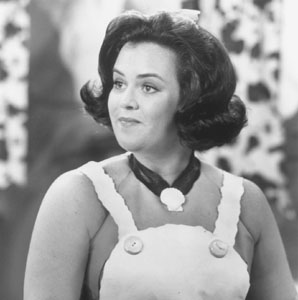Must-See-Me TV
Photo by Ron Batzdorff
The culture of narcissism rules chat shows
By Zack Stentz
IT'S AMAZING how much one misses by going to work in the daytime instead of watching TV. During a long stretch of unemployment in 1992, I was lucky enough to watch in horrified fascination, live on CNN, the incineration of the Branch Davidian compound. Though I was sitting on a sofa a thousand miles from Waco, the effect was infinitely more powerful than watching it in predigested form, edited and with portentous commentary, on the evening news.
And just recently, while on vacation, I got to watch Madonna on Rosie O'Donnell's show. It was all entertaining enough, seeing the full, unpredigested footage of the former material girl prattling about baby spit-up and quests for Tickle Me Elmos, but I couldn't help noticing how incessantly O'Donnell kept turning the conversation back to the subject of herself.
A quick scan of her daytime competitors--Oprah, Sally Jessy, Kathie Lee, et al.--revealed the same thing: Contemporary hosts of the talk show, a format supposedly about interviewing guests, have become preoccupied instead with the narcissistic exploration of their own lives and loves.
Having never actually seen her show before then, I had accepted at face value the media's coronation of O'Donnell as some sort of new queen of niceness on daytime TV, sweeping away the combative "You a ho!--No, you a ho!" practice of setting promiscuous inner-city and trailer-court denizens against each other.
But were those verbal cockfights of the lumpen proletariat (which made the E! channel's daytime-TV- highlight reel, Talk Soup, so much fun) really worse than Rosie's incessant chatter about her son, her movie career, her mock feud with Donny Osmond? I don't think so. Not anymore.
I BLAME GONZO journalism for this trend toward chat-show self-absorption. Raised on the writing of Tom Wolfe and Hunter S. Thompson, a whole generation of television writers, producers and viewers came to see an interviewer's self-referentialism as a welcome piercing of the illusion of objectivity.
By breaking up the narrative with acknowledgments of their own presence and even participation in events, interviewers sought to present themselves as surrogates for the audience, using the techniques of fiction to let them see events through the reporter's own eyes.
And along with this appropriation came the use of that other basic tool of fiction writing: fleshing out the character of the narrator. After all, went the theory, how can you trust the story being told without knowing who's doing the telling?
The local evening news shows were among the first to turn reporters and hosts into "personalities," dressing them down in khakis and sweaters and instructing them to pepper their broadcasts with canned banter and references to families and pets back at home.
It must have seemed like a nice idea at the time, to humanize the formerly Rushmore-like figure of the news anchor. But once trod upon, the road of self-referentialism led straight to John Tesh discussing his marital relations with Connie Sellecca on air on Entertainment Tonight.
Tesh has thankfully left Entertainment Tonight (that's E.T., for those of us pathetic enough to tune in to see if Bruce and Demi are getting along), off to inflict his grinning Easter Island statue of a face and major-key "musical compositions" on hapless suburbanites and pledge-week PBS viewers.
Even so, the "but first, more about me" problem on E.T. has degenerated even further. By far the worst offender of the lot is correspondent Julie Moran. On the self-absorption scale, Moran goes right past narcissism and straight into solipsism, often doing a remote from some party or film opening and delivering an entire monologue about her feelings, her life, her hair, entirely unmarred by any mention of the story she was sent to cover in the first place.
Her presence on the show is yet another symptom of a once reasonably entertaining program's sad decline. (The need to include daily a segment promoting those arch narcissists Pamela Anderson Lee and Lorenzo Lamas is another.)
MAINTAINING an interest in the personal lives of celebrities is one thing, a fairly straightforward phenomenon that predates television and goes back at least to the gossip columns and fan magazines of the Depression. But to follow obsessively the foibles and follies of the people who interview the celebrities is to enter a postmodernist echo chamber from which there can be no escape.
The inevitable next step in the process--turning the writers and producers of shows into celebrities--can already be seen taking shape, in the form of Regis and Kathie Lee using their yuppie producer as an on-air foil, and ex-Simpsons writer Conan O'Brien getting his own hosting slot.
And at the very end of the narcissism spectrum, blazing ultraviolet, is the promised convergence of television, computers and the Internet. Instead of mere Web pages, the future promises each and every one of us our very own globally broadcast televised talk show. And since we'll all be our own favorite subjects, there'll be no need for guests, or audiences for that matter, as the planet is bathed in the digital drone of six billion voices, all talking to themselves.
Somewhere in the afterlife, Walter Winchell and Christopher Lasch must be throwing back a drink and shaking their heads in dismay.
[ Metro | Metroactive Central | Archives ]
This page was designed and created by the Boulevards team.

Rosie-Fingered Dawning: Television's new Age of O'Donnell means never having to talk about anybody but yourself.
From the January 23-29, 1997 issue of Metro
Copyright © 1997 Metro Publishing, Inc.
![[Metroactive Arts]](/arts/gifs/art468.gif)